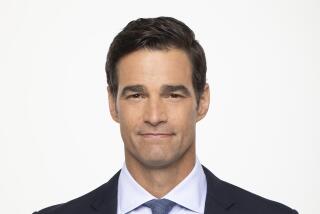Vivendi Shakes Up Board, Denies Messier’s Severance
Vivendi Universal’s new chief executive, Jean-Rene Fourtou, has figured out how to save his debt-heavy multinational conglomerate nearly $20 million: He’s vowing not to pay a dime in severance to his free-spending predecessor.
Following a board meeting in Paris, Fourtou departed from his widely expected presentation on the company’s future to take a harsh look back at former CEO Jean-Marie Messier, who spent billions of dollars buying Universal’s entertainment assets in Los Angeles and New York.
“He enjoyed making deals too much and overpaid,” Fourtou told reporters. “This all went to his head.... I decided nothing would be paid to Jean-Marie Messier, upon advice of lawyers.”
The normally understated Fourtou--unlike the flamboyant Messier--said he has been inundated with letters and e-mails from shareholders who have seen the value of their holdings fall 80% this year as the company became buried in debt resulting from its acquisitions.
“We are traumatized by what happened,” Fourtou said.
Messier could not be reached for comment.
Fourtou, 63, also announced that six board members resigned--four of them tied to Messier and his failed strategy for transforming the water utility into the world’s second-largest media company.
In a statement, Vivendi said the move was intended to streamline the board to 12 members from 18 and bring it into compliance with new U.S. and European governance standards. A source close to the board described the resignations as “a housecleaning.”
Among the outgoing board members was attorney Samuel Minzberg, who unlike other resigning directors was a fierce critic of Messier. Minzberg represents part of the Bronfman family, the company’s largest shareholders. Sources close to the board say Minzberg had antagonized many colleagues with his confrontational style and repeated rebukes of the company’s French directors for not acting as swiftly as he wanted. Minzberg could not be reached for comment.
Even with Minzberg’s departure, the Bronfmans have two strong voices on the board: Edgar Bronfman and his son, Edgar Bronfman Jr. The younger Bronfman built Universal Music Group into the world’s largest music company and was responsible for the studio until his family sold the business to Vivendi two years ago for $34 billion. During the last year, he has exerted his influence mostly through his position on the board.
On Wednesday, CEO Fourtou said he had asked Bronfman to take a more hands-on role with executives in Universal’s music, movie and theme park divisions.
“Now the real work starts,” Bronfman said, adding that he would help the management “try to determine how these businesses grow and prosper--hopefully intact.” In the meantime, the board is preparing a new financial incentive program because executives’ stock options are worthless after the plunge of the company’s share price.
The future of the entertainment assets has been the big question in Hollywood since Messier’s downfall. There has been speculation about spinoffs, sales and partnerships. After emerging from the two-hour board meeting at Vivendi’s headquarters near the Arc de Triomphe, Fourtou answered the question--sort of. He said that during the next two years, Vivendi would remain an international entertainment company “whether we like it or not.”
Fourtou said the time was wrong for moving forward with any ambitious sales or reorganizations because of depressed market conditions for media companies. Some change, he said, inevitably would come in the partnership between Vivendi and many of its entertainment properties overseen by Hollywood mogul Barry Diller.
“We both know that in the long term, things are going to have to be unwound, but for the moment it’s in our interests to keep it moving as it is,” Fourtou said. “[Diller’s] contribution is very valuable, but it can’t last in the long term.... We’re both aware of that.”
Fourtou did not elaborate on his statement.
“They are purposely keeping things tight-lipped to see what they can buy and sell,” said Michael Nathanson, an analyst with Sanford C. Bernstein & Co. “These guys have a menu of problems, and at the bottom of the list is what to do with Vivendi Universal Entertainment.”
Among those problems is what to do about Vivendi Environnement , France’s largest water supplier. The government there has insisted that the company not sell its 40% stake to a foreign buyer. On Wednesday, Fourtou again was vague about the issue. Responding to reports that he would put the utility on the block, he would only say: “I never said I wanted to sell.”
Fourtou had hoped to be able to present the board with a comprehensive strategy for refashioning Vivendi. But he said reality intruded. In his 45-minute conference with reporters, he stressed that he was confronted with financial problems so severe that they consumed all his attention.
“I had planned to do a good job and work in a serene environment in order to be ready for the Sept. 25 meeting,” Fourtou said. “In fact, on the very first day I was confronted with a dramatic crisis which was about as unexpected as it was violent.”
Two hours into his job, Fourtou said, he received a call from Moody’s Investors Service informing him that Vivendi’s debt rating was being lowered to “junk” status because of the company’s $19-billion media-related debt.
The Moody’s action prompted some creditors to demand that their loans immediately be paid before the situation deteriorated further. “I was fighting fires daily just so we could survive,” Fourtou said.
In the next two months, Fourtou said, he and his new management team worked frantically with an army of bankers and lawyers to keep the company afloat. Last week, Vivendi succeeded in persuading its bankers to provide a nearly $3-billion loan to meet its cash needs for this year.
With the liquidity crisis “nearly solved,” he said, the challenge now is to raise billions more in asset sales to lower the debt.
“I’m working for [Vivendi Universal] shareholders who lost all their money, especially those who lost all their life savings.”
On Wednesday, Vivendi signed a deal to sell its money-losing Italian pay-TV operation Telepiu to Rupert Murdoch’s News Corp. for about $976 million.
*
Times researcher Achrene Sicakyuz in Paris contributed to this report.
More to Read
The biggest entertainment stories
Get our big stories about Hollywood, film, television, music, arts, culture and more right in your inbox as soon as they publish.
You may occasionally receive promotional content from the Los Angeles Times.







